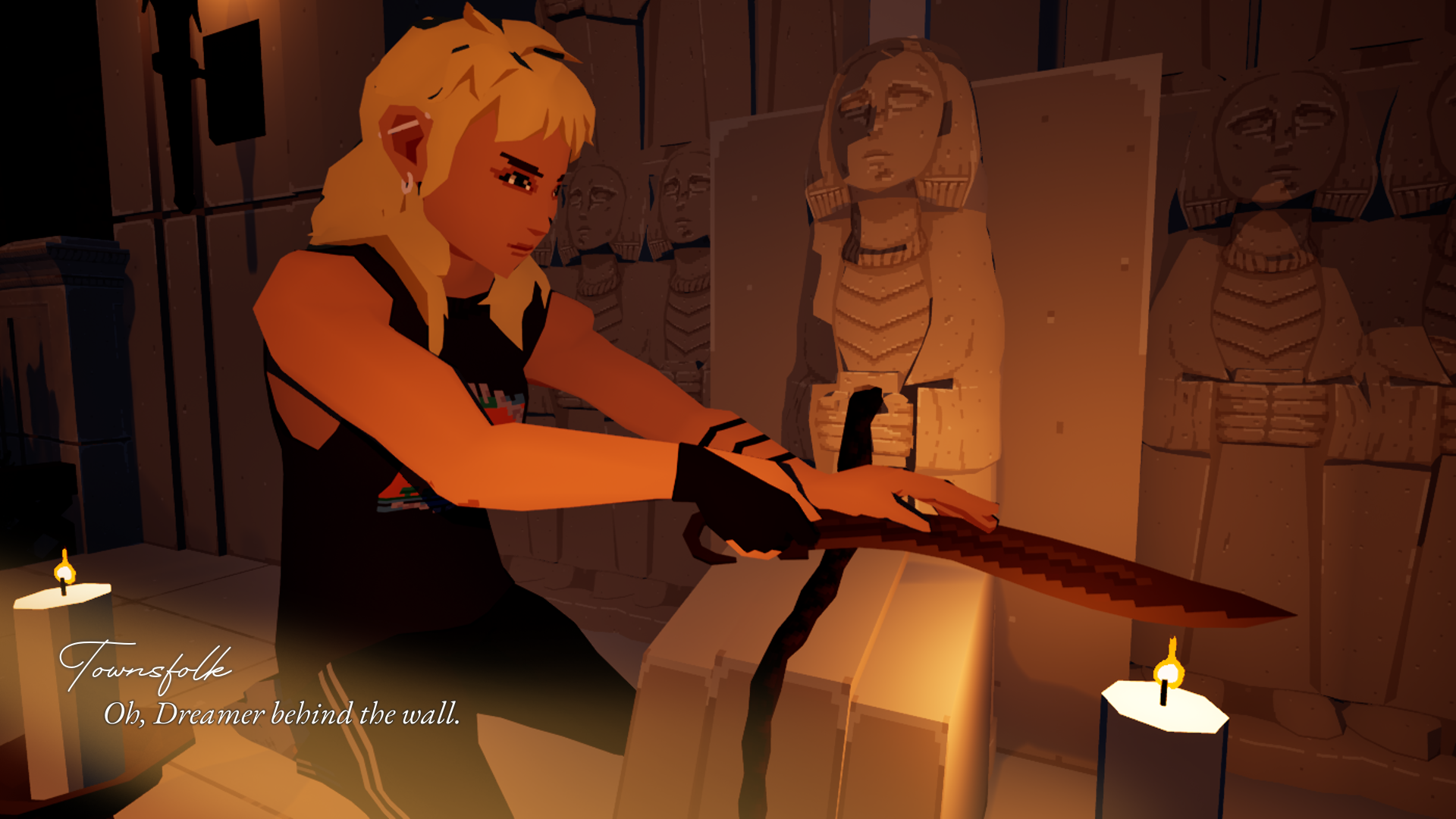Many Nights a Whisper is a game developed by the indie studios Deconstructeam and Selkie Harbour for PC and released in April 2025. On Steam, the game is described as a “short interactive essay on dreams, pressure, and expectations”.
You have been chosen to perform a ritual that will determine the fate of your people. As the Dreamer, you practice your archery skills in order to try and light up a distant chalice in a ritual where you’ll have only one (fiery) shot. In the week preceding this ritual, you hear the anonymous wishes from the locals through the Confession Wall and decide for yourself which wishes will be granted once you land the shot. If you miss it, none of the wishes will be granted and 10 years of calamity will follow.
In this post, I will go into 3 very different experiences playing Many Nights a Whisper: my own, Dodo’s (my partner), and Ronove’s (our friend).
As soon as I finished the game, I asked my partner to play it so we could discuss it. Do you know the feeling when you finish a game and you just HAVE to talk to someone about it? Luckily it didn’t take much to convince him. Ronove got curious and decided to play it right after him.
Some words from Dodo: “Both me and Ronove were thankful for the recommendation. The game is short and sweet and fun, especially if you share it with friends.” I hope this convinced you to pick this one up, because I’d love to hear more about other players’ experiences.

Practical information
Many Nights a Whisper is available for PC and it’s currently €2,99 in my Steam store location.
I played the game on the Steam Deck and it ran perfectly.
The playtime is 50-75 minutes; my own play time was around 100 minutes.
⚠ I highly recommend that you only keep reading if you’ve already played the game as the spoilers can influence your own experience. ⚠
Making impossible choices
Before starting the game, just judging by its description, I expected to feel the most pressure when trying to land the shot, since you only have one chance.
In reality, the tension was constant throughout. Every night you talk to people through the Confession Wall, where they tell you their wishes. If you decide to grant them, you have to cut off their long braids that they’ve grown for years just for this moment.

While some of their wishes felt like easy choices, others felt like they carried so much weight. For example, one of the citizens said they wanted to make it rain in the perfect amount (to avoid any droughts or floods), and granting it felt like a very straightforward decision. Another person asked to make gender irrelevant, which made me reflect for a long time. Other thought-provoking wishes also created similar dilemmas, and for me, the game’s greatest strength lay in these moments.

My experience: a creeping feeling of detachment
During my playthrough, what struck me the most was how selfish a lot of the wishes were. I rolled my eyes at requests like the person who wanted to make their boyfriend fall in love with someone else to avoid them having to take the initiative to break up. I was so immersed in the game that it just felt absurd to me that I was dedicating 10 years of my life as the Dreamer, feeling a crazy amount of pressure, while so many of the wishes were so self-serving.
Each day I cared a little less about practicing. By the time I had to make the shot, I was feeling so detached from my mission that I didn’t bother creating a strategy to land the shot in the big chalice. When I ultimately missed the shot, I wasn’t upset at all.
If you miss the shot, the game gives you a cutscene with an internal monologue that’s very poignant. It touches on how even in failure, there can be a sense of relief. This ending felt exactly like the closure I needed.
Dodo’s experience: a strong sense of responsibility
When talking to my partner Dodo, first we discussed if each one of us had landed the shot: he did, unlike me.
He told me that he had a similar feeling as me – some of the wishes were a big dilemma, while others felt silly – but a major difference stood out to me. Dodo followed the rules very closely – for example, he got called out by the mentor for not granting enough wishes, and he started granting more of those, whenever it made sense to him; in one of my favourite moments in the game, when your mother visits you in the Confession Wall, he stayed quiet – unlike me, who told her that I chose to forgive her. He also practiced the final shot many times and created a strategy to be able to land it during the ritual.
Dodo’s choices were motivated by a strong sense of responsibility. He wasn’t concerned about his character, but much more about the outcomes of a negative result. He would’ve hated it if this happened. You could say his focus was the collective outcome and his duty to the community, even if it changed the status quo.
Ronove’s experience: restraint over intervention
Our friend Ronove didn’t land the shot, though unlike me, it was not for lack of skill or strategy, but because he didn’t grant enough wishes and his shot couldn’t reach that distance.
Ronove felt that it wasn’t right to disturb the world by changing things radically. A lot of the wishes would alter reality too much and granting them wasn’t the right thing to do. Unlike Dodo, who felt responsibility for the society, Ronove felt his duty was not to intervene in the natural order of things, as much as possible.
Between selfish wishes and those reality-altering ones, he chose to take a conservative approach which resulted in falling short of braids that would improve the reach of the shots. Because the game wasn’t so clear about how many wishes you had to grant, this was an unforeseen outcome for Ronove. There wasn’t a special cutscene in this situation, as he got the same ending that I did, leaving him with a certain lack of closure.
Final thoughts
It’s amazing to me that even with such a short game, the three of us could have totally different experiences. My approach was individualistic and focused on my feelings as the Dreamer. Dodo’s put society first, feeling responsible for the citizens. Ronove’s was naturalistic, opposed to changing how things are supposed to be.
I love indie games that can pack a punch with so little play time and Many Nights a Whisper did exactly that!
Thank you both Dodo and Ronove for allowing me to share your experiences and I hope I did them justice with my writing.
Did you play Many Nights a Whisper?
I am super curious to hear what was YOUR experience. Did you relate to how any of us played the game?
Thank you for reading!
-Luna


Leave a Reply to Joe Cancel reply